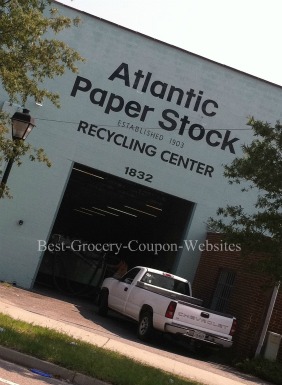Ideas for Going Green at Home by Reducing Household Waste
by Jennifer Scheffel

Ideas For Going Green
Ideas for going green at home by reducing household waste start at the grocery store.
Most people would agree that the bulk of household trash comes from the kitchen. A single day can produce an entire bag of trash in many households. And where does all that trash end up? At the landfill, of course.
When a friend told me that her sister's family of four only produced a small grocery bag of trash per month, I was shocked! How can a family do this? It set me on a mission to discover ideas for going green that could help me reduce household waste in my own kitchen.
It turns out that if you compost all your food scraps, recycle everything that can be recycled and pay close attention to avoiding the purchase of non-recyclable products, you'll end up with very little trash.
Ideas for Going Green: Where to Start
My husband works in money management. Part of his job is to project the outcome of a stock purchase before making a decision to buy. His favorite saying is, "Every good plan needs an exit strategy."
Reducing household waste is no different. You need an exit strategy: a plan to reduce waste before making purchases. This is why reducing household waste starts at the grocery store.
Here are some ideas for going green when grocery shopping.
Ideas for Going Green at Home and Reducing Household Waste
Purchase Reduced Packaging
Purchase Recyclable Packaging
Bring Your Own Grocery Bags And Why I Do Not Always Do This.
Purchase Organic and Earth Friendly Brands
Funny, true story: Years ago I was in a grocery store with my roommate. We both shared the grocery costs. My friend spotted a package of bagged pre-washed lettuce from what she thought was my shopping cart. She picked up the bagged lettuce from the cart and held it up for me to see. "This bagged lettuce is a waste! It's twice as expensive and the bag's going straight to the landfill. How lazy are you?!"
I replied, "That's not my cart."
Oh, the humiliation when my roommate discovered that the lettuce belonged to the woman standing next to me! We were both mortified. But the truth stings a little.
The best way to reduce kitchen waste is to avoid purchasing packaged produce and items with excess packaging.
I often see shoppers put produce in plastic bags provided by the grocery store. These plastic bags are then put into more plastic bags designed for carrying food home. All of this ends up in the trash.
Avoid the produce bags all together. Your produce has probably been on the ground or in a dirty container and a delivery truck. Think about it: it grows from the earth! The plastic bag provides a false sense of security or cleanliness. Simply wash your produce before consuming it.
Purchase Recyclable Packaging
Avoid packaging that can't be recycled. Check with your local recycling service for restrictions. Purchase products in glass jars, paper packaging, or plastic that can be recycled.
My community recycling service will not accept plastic bottles with wide mouths. Plastic peanut butter jars go into the landfill. The solution is simple; I purchase peanut butter that comes in glass jars.
Another example of packaging that can't be recycled in all areas is antiseptic cartons that contain soups, soymilk, and drinks. If your area doesn't accept these cartons, consider purchasing soup in recyclable cans and soy milk from the dairy section in regular paper cartons.
I'm a frugal girl and I realize that sometimes making decisions based on packaging can cost a little more. The pennies spent saving a landfill from needless plastic jars are worth it to me. However, you'll find that if you stock up on your favorite brands when they are on sale and when you have a coupon, going green at home doesn't have to cost more.
By now, everyone has heard that you should bring your own grocery bags to the store. I've received so many grocery bags from promotional groups that I'm up to my ears in re-usable grocery bags!
Since I can only use 10 useable bags, I give my extra ones away at the grocery store to people who don't have any!
Occasionally, I don't bring my own reusable grocery bags on shopping day. Why? Again, I'm frugal and I want to stock up on paper bags.
I use paper bags for kitchen trash. In my household, we produce about one bag per week not as good as the friend's sister I mentioned earlier, but it's better than it was!
Paper bags decompose and plastic bags don't. Even eco-friendly bags that claim to decompose in landfills have their limits. The landfill must receive rain and sunshine for these bags to decompose, and not all do.
You might be thinking that paper doesn't hold up to kitchen waste. But remember, if you're composting your food waste, nothing wet or gross goes into the paper bag.
Purchase Organic and Earth Friendly Brands
Get to know earth friendly brands, and put your money where your heart is. Many people believe that organic and earth friendly brands are more expensive than conventional brands. This is often true, but not always.
You can get organic coupons and purchase your favorite brands when they are on sale if cost is an issue. I've found that I get what I pay for when it comes to purchasing organic food.
For me, the health benefits and taste make organic, earth-friendly products a wise choice. I've also found that many organic foods ironically have a longer shelf life than food with preservatives. This transfers to less food waste.
Earth friendly brands can include toilet paper tissue from post-consumer content (not from old growth trees like standard brands) and dish soap that doesn't pollute waterways. You may also consider that while earth friendly products might cost a little more now, it will save you (and everyone) health care costs in the future.

This article was contributed by Jennifer Scheffel of www.best-grocery-coupon-websites.com where you can get reviews on the grocery coupon sites, print coupons and learn more ways to save money.







